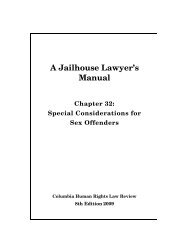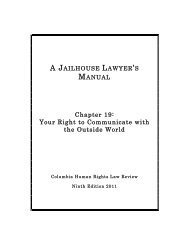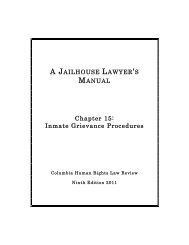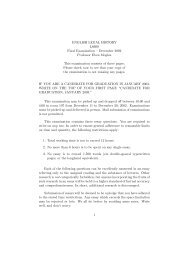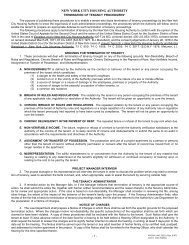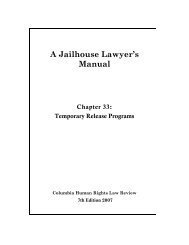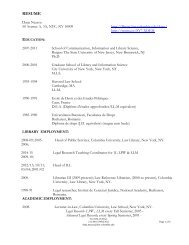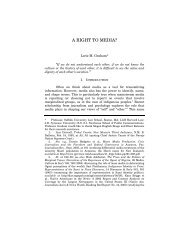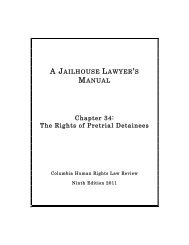The Right to Dignity Rex D. Glensy - Columbia Law School
The Right to Dignity Rex D. Glensy - Columbia Law School
The Right to Dignity Rex D. Glensy - Columbia Law School
You also want an ePaper? Increase the reach of your titles
YUMPU automatically turns print PDFs into web optimized ePapers that Google loves.
2011] <strong>The</strong> <strong>Right</strong> <strong>to</strong> <strong>Dignity</strong> 135<br />
on which all of society—legal and otherwise—rests. 317 Thus, human<br />
dignity is said <strong>to</strong> function as an allencompassing pervasive value<br />
that forms the fabric of modern democracy, 318 even though the<br />
practical meaning of this is not always explained. In this framework,<br />
the right <strong>to</strong> dignity is widely invoked as both a legal ground and a<br />
moral basis for redress of certain violations by the government or by<br />
private individuals. However, reliance on human dignity as one of our<br />
most basic human values is not merely confined <strong>to</strong> the legal texts and<br />
judicial pronouncements. In pitching or <strong>to</strong>uting legislative initiatives,<br />
the political class often links policy goals <strong>to</strong> dignitary interests. 319<br />
<strong>The</strong>se statements, and others that pertain <strong>to</strong> the immutability of<br />
dignity or its presumed high value in the minds and hearts of all<br />
people, probably stem from the fact that they are comfortably general<br />
and they are also quite difficult either <strong>to</strong> disagree with and disprove.<br />
<strong>The</strong> effect of this is the impression that “[m]oralists of various sorts<br />
use the term[] ‘human dignity’ . . . often, but frequently these words<br />
have little more than rhe<strong>to</strong>rical effect . . . .” 320<br />
It is upon this “rhe<strong>to</strong>rical effect” that the fourth possible<br />
approach <strong>to</strong> the right <strong>to</strong> dignity depends. Legal statements of all<br />
shapes and sizes are intended <strong>to</strong> have the effect of inducing<br />
compliance (if legislative) or of redressing past wrongdoing (if<br />
judicial); therefore, there is a clear practical consequence of what gets<br />
said within these legal structures. However, there is another level of<br />
communication that is served through observation of legal<br />
pronouncements—that such statements represent the societal<br />
representation of either the descriptive (what is) or the normative<br />
(what should be). In other words, statements of law have an inherent<br />
worth detachable from the instrumental purposes that they serve:<br />
<strong>The</strong>y are expressive. Thus, all the representations of the right <strong>to</strong><br />
dignity that have been detailed in this Article do not merely resolve a<br />
case, or set forth a legislative, constitutional, or international<br />
317. See, e.g., Martti Koskenniemi, Constitutionalism as Mindset:<br />
Reflections on Kantian <strong>The</strong>mes about International <strong>Law</strong> and Globalization, 8<br />
<strong>The</strong>oretical Inquiries L. 9, 18 (2007) (referring <strong>to</strong> this as a “constitutional<br />
mindset”).<br />
318. See Vlad F. Perju, <strong>The</strong> Puzzling Parameters of the Foreign <strong>Law</strong><br />
Debate, 2007 Utah L. Rev. 167, 184.<br />
319. See, e.g., William J. Clin<strong>to</strong>n, President’s Radio Address (June 24,<br />
2000), available at http://www.presidency.ucsb.edu/ws/index.php?pid<br />
=26#axzz1YzuMw6Ca (justifying additional Medicare benefits by arguing that<br />
“we have few responsibilities more important than helping our older Americans<br />
live out their lives with quality and in dignity.”).<br />
320. Harris, supra note 3, at 1.



